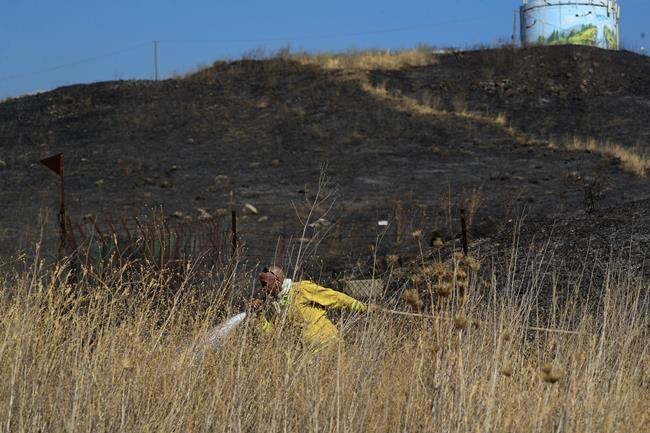TEL AVIV, Israel (AP) — Israel on Thursday escalated its response to rocket attacks the previous day from Lebanon by launching rare airstrikes on its northern neighbor, the army and Lebanese officials said.
A statement from the Israeli military said jets struck the launch sites from which the rockets were fired, as well as an additional target used to attack Israel in the past. The military blamed the state of Lebanon for the shelling and warned “against further attempts to harm Israeli civilians and Israel's sovereignty.”
The overnight airstrikes in southern Lebanon were a marked escalation at a politically sensitive time. Israel's new eight-party governing coalition is trying to keep peace under a fragile cease-fire that ended an 11-day war with Hamas' militant rulers in Gaza in May. Several incidents leading up to this week's rocket fire from Lebanon have focused attention on Israel's northern border. The United States swiftly condemned the attacks on Israel.
Lebanon is mired in multiple crises, including a devastating economic and financial meltdown and a political deadlock that has left the country without a functional government for a full year.
Lebanese President Michel Aoun said Israel’s use of its air force to target Lebanese villages “is the first of its kind since 2006 and indicated the presence of aggressive, escalatory intentions” against Lebanon. In a statement, he said Lebanon would submit a complaint to the United Nations.
The commander of the U.N. peacekeeping force in Lebanon, known as UNIFIL, Stefano Del Col, called on the parties “to act with urgency” to de-escalate tensions and prevent violations of the cessation of hostilities that has been in effect since 2006.
Israel and the Lebanese militant group Hezbollah fought a devastating, monthlong war in 2006 which killed some 1,200 Lebanese, mostly civilians, and around 160 Israelis, mostly soldiers. The war failed to neutralize the group’s rocket threat, and Israeli officials say the Iran-backed Hezbollah’s improved missile arsenal is now capable of striking virtually anywhere in Israel.
No one has claimed responsibility for the rocket fire from Lebanon, and Hezbollah has not commented. The Hezbollah-owned Al-Manar TV reported the Israeli strikes at around 2 a.m. Thursday, saying they hit an empty area in the village of Mahmoudiya in Marjayoun district.
Avichai Adraee, the Israeli army’s Arabic-language spokesman, said the Lebanese government is responsible for what happens on its territory and warned against more attacks on Israel from southern Lebanon.
On Wednesday, three rockets were fired from Lebanon into Israeli territory and Israel responded with sustained artillery fire. Sirens sounded in northern Israel, warning of a possible rocket attack. Two rockets landed inside Israeli territory, the army said.
Channel 12 said one rocket exploded in an open area and another was intercepted by Israel’s defense system, known as the Iron Dome. Israeli media reported that the incoming rockets set off fires near Kiryat Shmona, a community of about 20,000 people near the Lebanese border.
The Lebanese military said 92 artillery shells were fired by Israel on Lebanese villages as a result of Wednesday's rocket fire from Lebanon. It said the Israeli artillery shelling resulted in a fire in the village of Rashaya al-Fukhar. The Lebanese army also said it was conducting patrols in the border region and had set up a number of checkpoints and opened an investigation to determine the source of the rocket fire.
There have been several similar incidents in recent months.
U.S. State Department spokesman Ned Price condemned the rocket fire from Lebanon.
“Israel has the right to defend itself against such attacks,” he told reporters on Wednesday in Washington, adding that the U.S. would remain engaged with partners “in the region in an effort to de-escalate the situation.”
___
Karam reported from Beirut.
Laurie Kellman And Zeina Karam, The Associated Press

